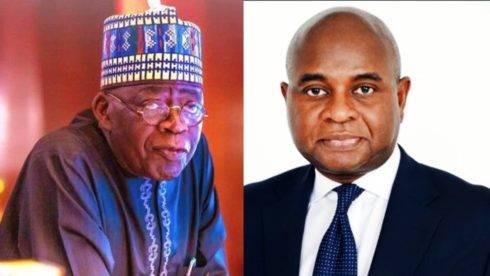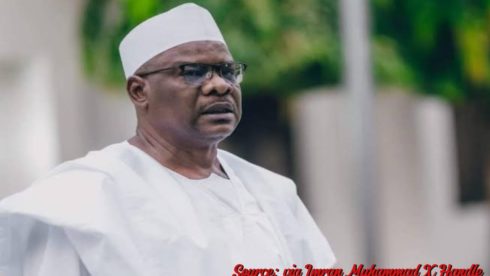In his recent advisory to President Tinubu, Kingsley Moghalu the former deputy governor of the Central Bank of Nigeria, underscored the urgency of a cabinet reshuffle to rejuvenate investor confidence in Nigeria’s economic strategies. Kingsley Moghalu argued that the prolonged and politically-driven nature of cabinet appointments has dissuaded investors looking for expertise-driven solutions to the country’s economic hurdles. By advocating for a streamlined and technocratic approach to selecting cabinet members, Moghalu believes that Nigeria can signal its commitment to efficient governance, ultimately paving the way for increased investment inflows and economic resilience.
Kingsley Moghalu’s, proposal hinges on the notion that a swift and technocratic cabinet reshuffle could serve as a catalyst for bolstering investor trust, thereby fostering economic growth and stability. By prioritizing competence and expertise over political affiliations in the selection process, Nigeria can demonstrate its dedication to addressing economic challenges with pragmatic solutions. This approach, according to Kingsley Moghalu, has the potential to reinvigorate the confidence of both domestic and international investors, positioning Nigeria as a favorable destination for capital inflows and long-term economic development.
Kingsley Moghalu: Addressing Investor Confidence through Economic Advisory Council
Former presidential candidate Kingsley Moghalu presents a comprehensive plan for revitalizing Nigeria’s economy, advocating not only for a cabinet reshuffle but also for the creation of a specialized Economic Advisory Council. This council, comprised of experts across diverse economic domains, would serve as a crucial think tank, providing President Tinubu with nuanced insights and strategic guidance to navigate Nigeria’s economic challenges. Moghalu emphasizes the importance of leveraging the collective expertise of such a council to formulate targeted policies that can enhance investor confidence and foster sustainable economic growth. By implementing these reforms, President Tinubu has the opportunity to demonstrate proactive leadership in steering Nigeria towards a path of prosperity.
In Kingsley Moghalu’s vision, the establishment of a dedicated Economic Advisory Council signifies a commitment to evidence-based policymaking and a departure from ad-hoc economic strategies. With the input of experts in fields ranging from macroeconomics to finance, the council would offer holistic solutions to tackle Nigeria’s pressing economic issues. Moghalu contends that such a proactive approach is essential for addressing the systemic challenges hindering Nigeria’s growth potential. By prioritizing the formation of this specialized council, President Tinubu can signal to both domestic and international stakeholders his administration’s commitment to fostering a conducive environment for economic stability and prosperity in Nigeria.
Understanding Nigeria’s Economic Challenges: Insights from Kingsley Moghalu
In his comprehensive analysis, Kingsley Moghalu underscores the imperative of delving deep into the multifaceted factors that underpin Nigeria’s economic woes. He advocates for a nuanced approach that not only acknowledges but also tackles issues ranging from bureaucratic incompetence to a deficit of political will, alongside inherent structural deficiencies. By dissecting these root causes, Moghalu contends that Nigeria can pave the way for sustainable solutions, effectively navigating through its current crisis while fortifying itself against future economic uncertainties.
Kingsley Moghalu’s emphasis on identifying and remedying systemic flaws resonates as a crucial step towards fostering stability and prosperity in Nigeria. Through targeted interventions addressing incompetence, bolstering political resolve, and restructuring fundamental frameworks, Nigeria stands poised to carve out a more resilient trajectory. By incorporating these insights into policy formulation and implementation, Nigeria can lay the groundwork for a robust economic resurgence, heralding an era of sustained growth and development.
Recommendations for a Specialized Economic Advisory Council
In his groundbreaking analysis, Kingsley Moghalu underscores the critical importance of recognizing the interdisciplinary dynamics within economic governance. To address Nigeria’s economic challenges comprehensively, he proposes the establishment of a dedicated Economic Advisory Council. This council, comprised of experts spanning diverse domains including fiscal policy, industrial policy, and trade policy, would be instrumental in navigating the complexities of the nation’s economy. By assembling specialists from various fields, the council can provide nuanced insights and innovative strategies to foster structural diversification and bolster economic resilience.
Moghalu’s advocacy for a full-time Economic Advisory Council underscores his commitment to harnessing a broad spectrum of expertise. By promoting collaboration among specialists with distinct perspectives, his proposal seeks to transcend traditional silos and cultivate holistic solutions. Through this approach, Nigeria can leverage the collective wisdom of diverse disciplines to navigate economic challenges, laying the groundwork for sustainable growth and prosperity.
Strategic Approach to Economic Policy Formulation
In his address, Moghalu highlights the criticality of embracing a strategic methodology when formulating economic policies. He stresses the significance of coherence and consistency in decision-making processes, advocating for a structured approach to ensure alignment with national objectives. By advocating for the establishment of a multidisciplinary Economic Advisory Council, Moghalu proposes a platform where diverse perspectives can be synthesized to develop comprehensive strategies. Through this collaborative effort, President Tinubu can steer Nigeria towards economic diversification, reducing its dependence on volatile sectors like oil and agriculture. This strategic pivot is not only crucial for mitigating risks associated with global economic fluctuations but also for laying the groundwork for sustained growth and resilience in the Nigerian economy.
Moghalu further asserts that prioritizing long-term economic sustainability is paramount in navigating the uncertainties of the global landscape. By adopting a proactive stance towards diversification, Nigeria can unlock new avenues for growth and development while reducing its vulnerability to external shocks. Moreover, a well-thought-out strategic approach can enhance investor confidence, attract foreign investment, and stimulate domestic entrepreneurship, fostering a conducive environment for economic expansion. Through concerted efforts guided by a cohesive economic strategy, Nigeria under President Tinubu’s leadership can embark on a trajectory towards prosperity, resilience, and inclusive growth, thereby fulfilling its potential as a dynamic player in the global economy.
Building a Resilient Economic Future for Nigeria: Kingsley Moghalu’s Call to Action
In a stirring address, Professor Kingsley Moghalu has underscored the urgent need for proactive measures to fortify Nigeria’s economic future. Central to his message is the call for policymakers to prioritize a multifaceted strategy encompassing structural reforms, innovation, and diversification. By steering away from reliance on volatile sectors and embracing a diversified economic landscape, Nigeria can achieve greater stability and mitigate the risks posed by external shocks. Moghalu’s emphasis on structural reforms resonates with the imperative to address underlying issues and foster a more resilient economic foundation, capable of withstanding turbulent global conditions.
Furthermore, Moghalu advocates for the establishment of a specialized advisory council to harness expert insights and guide economic governance effectively. This holistic approach, he argues, will enable Nigeria to navigate its current challenges with agility and position itself as a formidable player on the global economic stage. By tapping into a diverse range of perspectives and expertise, policymakers can chart a course towards sustainable growth and prosperity, ensuring that Nigeria emerges stronger and more resilient in the face of adversity.
Table of Contents
Discover more from OGM News NG
Subscribe to get the latest posts sent to your email.













